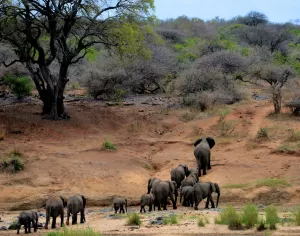Zimbabwe relocated thousands of wild animals to new habitats , the move is part of a larger effort to protect Zimbabwe’s wildlife from impacts of climate change
Zimbabwe has relocated thousands of wild animals to protect them from climate change

Story by Shepherd Chabata
Zimbabwe has relocated thousands of wild animals to new habitats to protect them from the effects of climate change.
The move is part of a larger effort to protect Zimbabwe’s wildlife from the impacts of climate change, which is expected to bring more frequent and intense droughts in the coming years.
Through Project Rewild Zambezi, Zimbabwe has begun a massive animal relocation project. Over 2,800 animals which include 400 elephants, 2,000 impalas, 70 giraffes, 50 buffaloes, 50 wildebeest, 50 zebras, 50 elands, 10 lions and a pack of 10 wild dogs are being moved from the Save Valley Conservancy in the south to three conservancies in the north: Sapi, Matusadonha and Chizarira.
Project Rewild Zambezi is a continuation of Operation Noah, but with a different focus. This is one of the largest live animal capture and translocation exercises ever conducted in southern Africa since Operation Noah.
The goal is to restore the wildlife populations in the Zambezi River valley, which have been depleted by poaching, habitat destruction, and human-wildlife conflict. The project will involve moving animals from other parts of Zimbabwe to the Zambezi River valley, as well as reintroducing species that have been extirpated from the area.
The project will also focus on improving habitat quality and providing better protection for wildlife in the area. Ultimately, the goal is to create a healthy and sustainable ecosystem in the Zambezi River valley that can support a wide variety of wildlife species. This also conserves our tourism resources.
The Zimbabwe National Parks and Wildlife Management Authority has been forced to relocate wildlife due to a severe lack of water caused by a prolonged drought, according to spokesman Tinashe Farawo.
The parks agency issued permits to allow the animals to be moved to avert “a disaster from happening,” said Farawo.
“We are doing this to relieve pressure. For years we have fought poaching and just as we are winning that war, climate change has emerged as the biggest threat to our wildlife,” Farawo told The Associated Press.

“Many of our parks are becoming overpopulated and there is little water or food. The animals end up destroying their habitats, they become a danger unto themselves and they encroach neighbouring human settlements for food resulting in incessant conflict,” he said.
The relocation project has been funded by the World Wildlife Fund (WWF) and other conservation groups. It is hoped that the animals will be able to adapt better in their new habitats, where they will have access to food and water during times of drought.
Sapi Reserve, a privately-run 280,000-acre private concession located east of Mana Pools National Park, is providing a new home for many animals in Zimbabwe. Great Plains Chief Executive Officer Dereck Joubert has described it as the ‘perfect solution’ due to its location within the 1.6 million acre middle-Zambezi biosphere.
Before 2017, decades of hunting had caused wildlife populations in Sapi Reserve to decline drastically. However, Joubert and his team are now working hard to restore the area to its former glory by rewilding and restoring the wild.
The PWMA also plans to introduce measures such as water harvesting systems to help the animals cope with future droughts.
“We are doing all we can to ensure that our wildlife is protected,” Farawo said. “This includes providing them with safe habitats where they can thrive.”
The relocation project is part of a larger effort by Zimbabwean authorities to protect its wildlife from the effects of climate change. The country has also implemented measures such as anti-poaching campaigns and habitat restoration projects to preserve its biodiversity for future generations.




